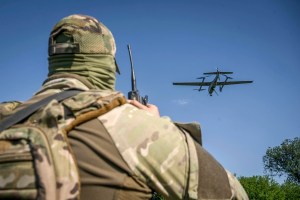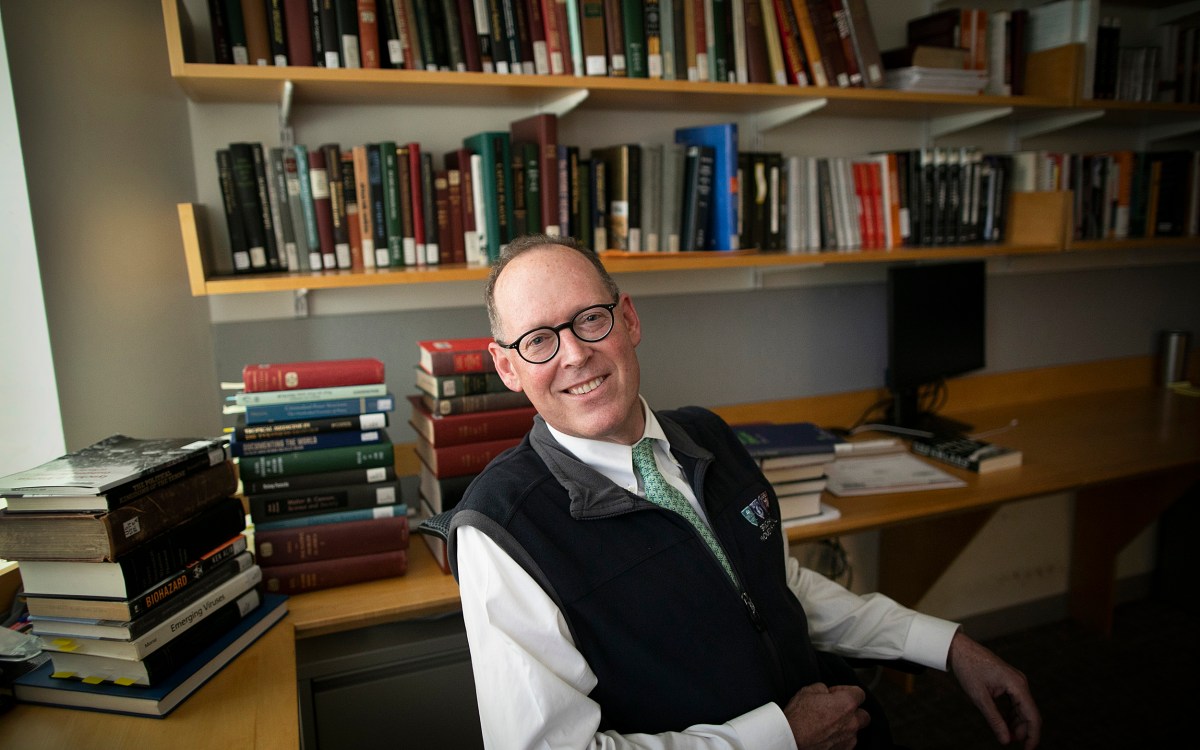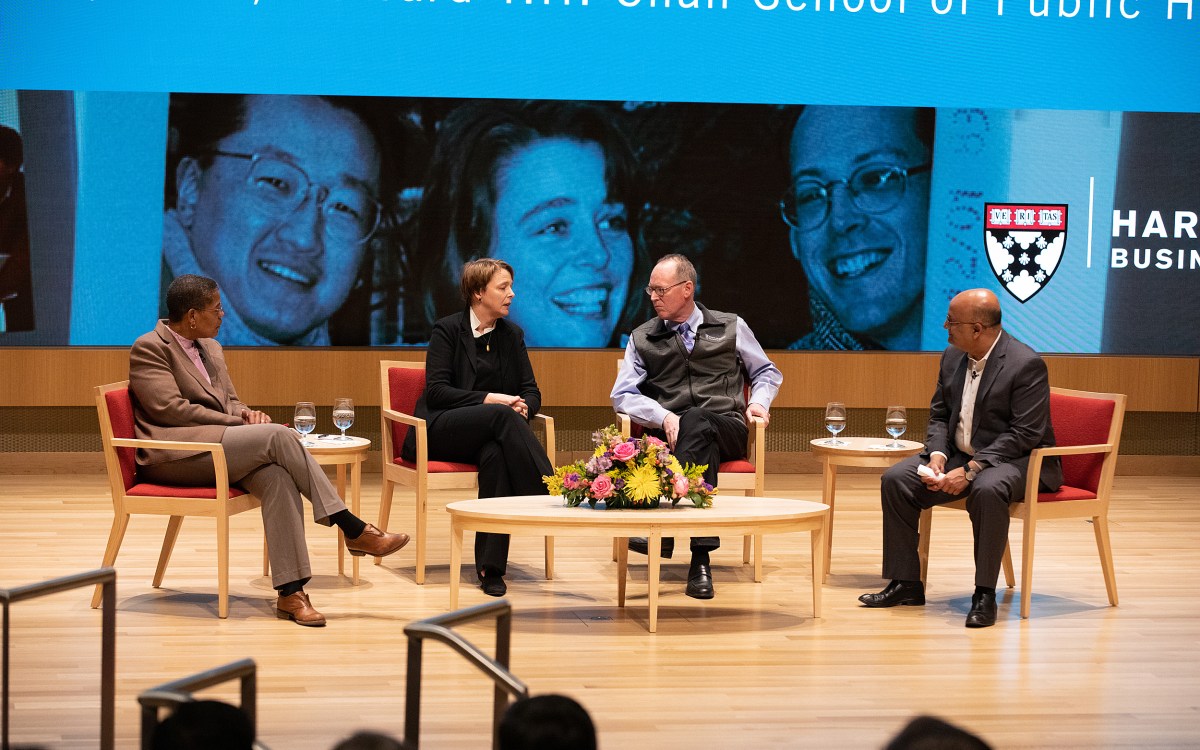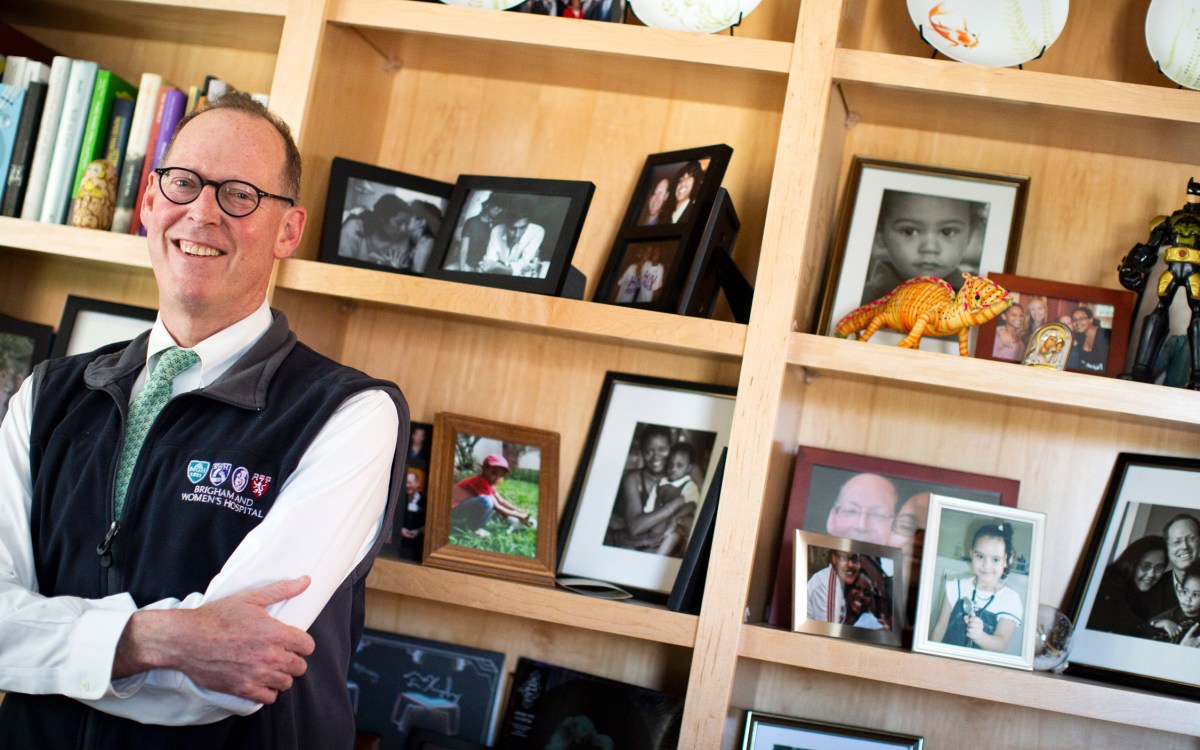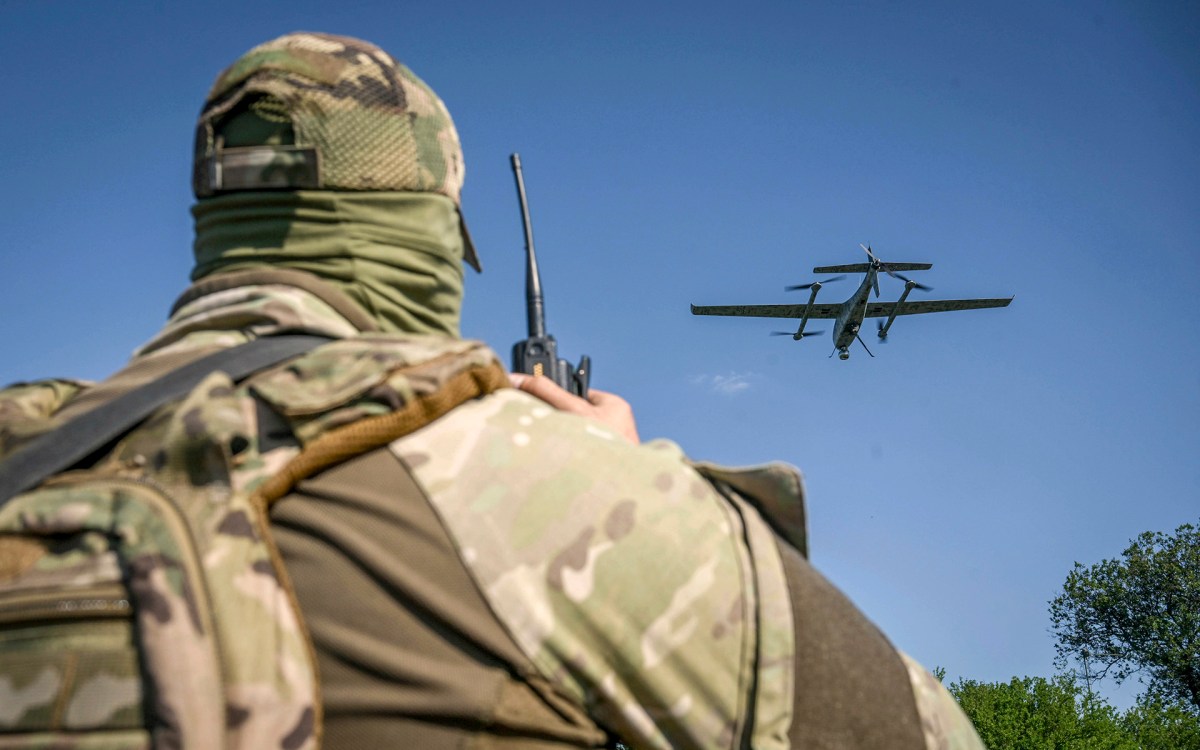‘Real resolve’ in Haiti, Farmer says
Partners In Health co-founder sees reason for hope in homegrown response to summer of suffering
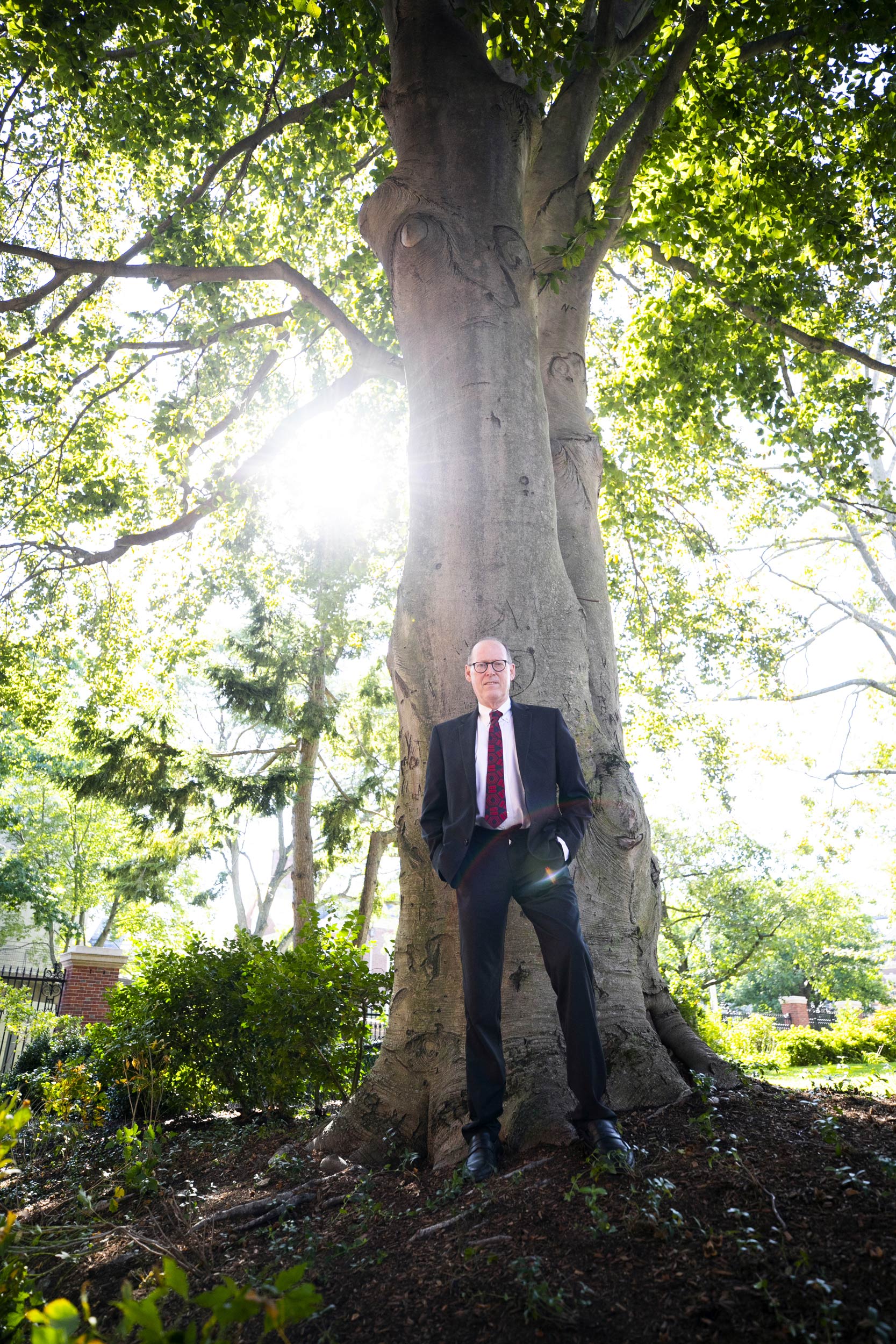
Partners In Health co-founder Paul Farmer says he sees resilience in Haiti, despite the repeated traumas visiting the country this summer.
Stephanie Mitchell/Harvard Staff Photographer
The summer was a season of devastation for Haiti, with a presidential assassination in early July, a major earthquake in mid-August that killed more than 2,000 people, and then, a few days later, the impact of tropical storm Grace. Paul Farmer, Harvard’s Kolokotrones University Professor of Global Health and Social Medicine and a founder of the nonprofit Partners In Health, has worked in Haiti for decades, including in the months following the 2010 earthquake, which claimed more than 200,000 lives. He spoke to the Gazette about the multiple traumas affecting the island nation. The interview was edited for clarity and length.
Q&A
Paul Farmer
GAZETTE: Were you in Haiti all summer or just after the earthquake?
FARMER: Just after the quake. The magnitude of this on the Richter scale was as bad as last time, but this time the quake spared the capital city [Port-au-Prince]. But it’s worth noting that the Haitians, in spite of setbacks, were better prepared and better trained. What I saw in the earthquake zone and elsewhere were a lot of very competent, youngish Haitian health professionals, mostly nurses and doctors, but also managers, logisticians, and drivers. They were very impressive. But just because the earthquake response was better, more organized than in 2010, that doesn’t mean that the stories of patients weren’t terrible. A lot of them were, and I’m still kind of wrestling with some of their stories.
I wasn’t entirely prepared to show up in the shake zone, thinking that this was going to trigger a lot of very unpleasant memories from 2010. But that’s not what happened and I was grateful.
GAZETTE: Because the scale of death was so much lower?
FARMER: It was that, for sure, but it was also seeing so many young and competent Haitians. Any time there’s a disaster like this, the first responders are always the locals, and they were doing it again. One kid who was trapped under a building for five days — this is not a patient I saw — had been herding goats near a building. He was pinned down and the way he survived, in the short term — although five days must seem like an eternity when you’re trapped — was by drinking the rainwater that fell on his shirt. But the reason he survived in the long term is that his best friend — another 18-year-old — was wandering around for days and didn’t give up calling his name out loud. Those stories stick with you.
At the Immaculée Conception Hospital in Les Cayes, Haiti, a doctor checks the X-ray of a person injured by the 7.2 magnitude earthquake.
AP Photo/Joseph Odelyn
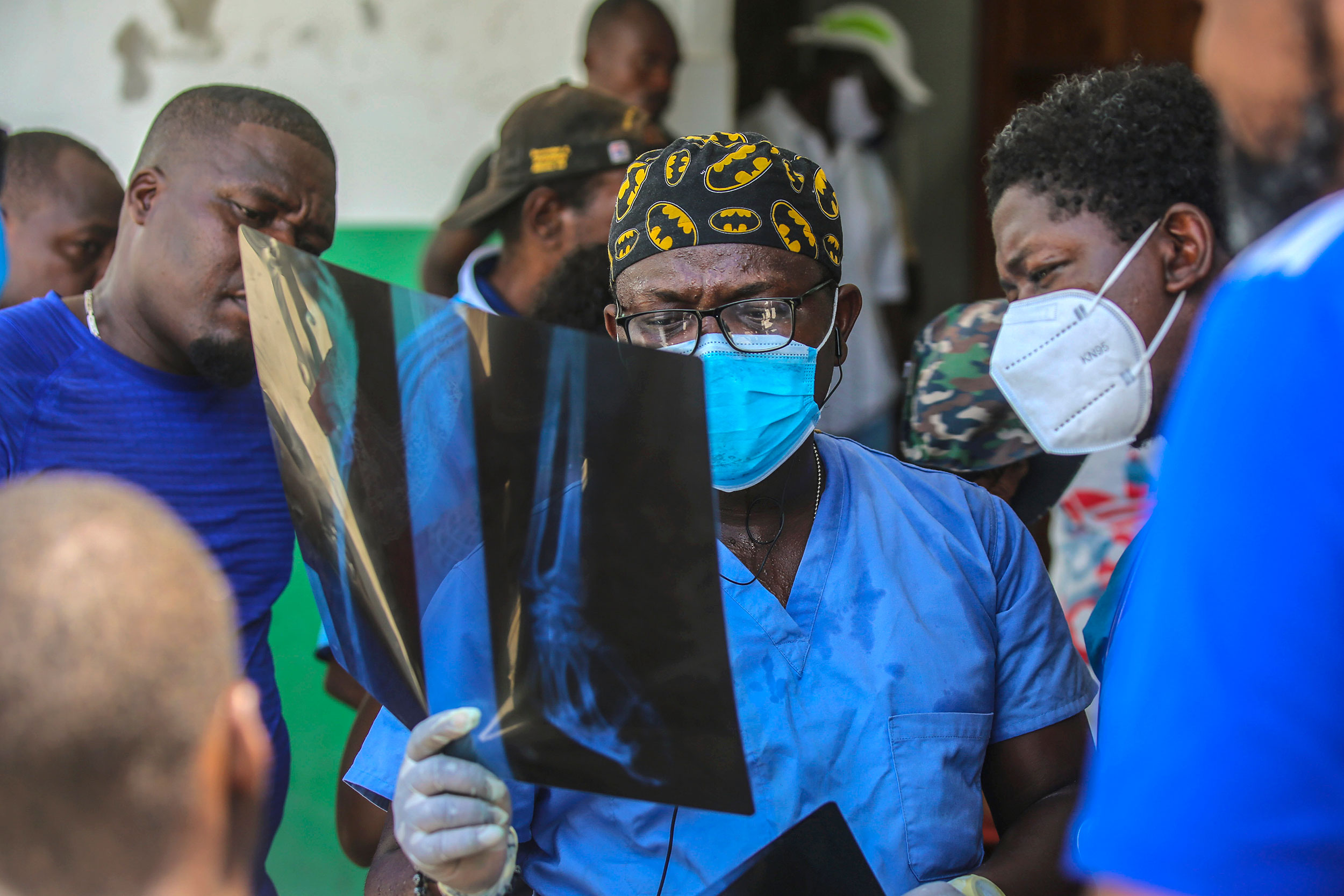
GAZETTE: Have a lot of the responders been trained by you and your Haitian partners over the years?
FARMER: Haiti has a lot of well-trained professionals. It’s not an accident that an estimated 15 percent of all Black American physicians in the United States are Haitian. They left Haiti for a reason, or several, and one of those reasons is that health professionals can’t get a lot done without training and the tools of the trade. When we launched Mirebalais (Hôpital Universitaire de Mirebalais), which wasn’t that long after the 2010 earthquake, there was no emergency-medicine training program in Haiti, and there never had been. And if you have a program like the one we started in Mirebalais to train emergency-medicine specialists and trauma nurses, and mental health teams, thinking about hidden trauma — if you’re doing that for a decade, and then there’s an earthquake, of course you would see your own trainees there. It was downright inspiring.
All of the emergency-room doctors in Haiti — and most of them are young women — were trained in Mirebalais and received a good deal of their training from Harvard faculty. So, when you are hearing me go on and on about Mirebalais, you should know it is a national training hub, not a regional one, and the other universities and med schools know that. That’s why they keep fighting to get their students in rotations there. It’s a big, busy hospital where you can learn a lot. Not just emergency-room doctors went to the quake zone — the trauma teams went, the orthopedic nurses, nurse anesthetists. I recognized a whole bunch of them in the earthquake zone and worked with some of them.
GAZETTE: Has the situation for staff, systems, and support in Haiti — the things you identify as key, along with good training, for high-quality care — improved over time?
“I thought it would be all doom and gloom, but that’s not what I saw. I’ve been doing this long enough to trust my first impression and I saw real resolve, a lot of teamwork, better coordination.”
FARMER: It has gotten better — though I don’t expect the great majority to say that unless they have a privileged vantage on medical care. Look at what they’ve gone through just this summer: a presidential assassination, gangs taking over a big part of Port au Prince, then the earthquake and the storm.
Given all that, I thought it would be all doom and gloom, but that’s not what I saw. I’ve been doing this long enough to trust my first impression and I saw real resolve, a lot of teamwork, better coordination. There wasn’t much in the way of an international response — this was mostly Haitians helping Haitians. In addition to going to public hospitals that were badly damaged, I also went to an NGO mission hospital. NGOs aren’t famous for teamwork but this group was working well with everybody too. It was very inspiring. You still hear the stories that break your heart, but if the overall story is one of a superior response, I think we should say that, too.
GAZETTE: How was the government response? Some of the media coverage I saw was not overwhelmingly positive.
FARMER: Haiti has a hollowed-out state and hollowed-out institutions. The new head of state, the prime minister who took office after the assassination, is a neurosurgeon who may be used to running a tight ship. But if the Haitian institutions are hollowed out, then they’re going to have trouble responding, even if they did a much better job than last time around. Of course, back then the National Palace was destroyed, the city and its hospitals were destroyed, and people in the central government suffered great personal losses as well. We didn’t see that scale of destruction last month.
Of course, there were great losses in the quake zone. I got close to one kid, 13 years old, named Etienne, whose mother and younger brother, 10 years old, both died on Aug. 14. He had a fractured pelvis, fractured femur, and a ruptured bladder requiring emergency exploratory surgery. The quake hit his home, which is not far as a crow flies, but many, many hours of traveling from whatever home he has left and whoever his surviving family is. His uncle came with him, a man by the wonderful name of Candy. He has seven kids of his own but he’s been by his nephew’s bedside all this time. There are lots of those stories, and it was inspiring to see how much thought those caregivers put into their care.
GAZETTE: President Jovenel Moïse was assassinated weeks before the earthquake. Did that event affect recovery efforts?
FARMER: In all the chatting with people that I did in Haiti, I didn’t hear many talking about it, even though I started my visit by meeting with the prime minister. I would have thought I’d be hearing about the political mess all day, every day. I didn’t. I heard about the things I’m used to hearing: school starting, no housing, no tuition money, no laptops, all the same complaints.
Despite that, it’s quite clear that the assassination is a devastating development. According to people who know more about political processes than I do, what Haiti really needed most was a couple of transitions without violence or another coup. People who haven’t been there and worked there say, “Come on, they’re not going to have another coup.” But history doesn’t really support that. And the impact of these developments is yet more institutional hollowing out.
The one health area where I think there’s going to be an immediate impact from the assassination is in the COVID vaccination campaign. We were launching it the day of the assassination. In fact, if you look at the main national daily, on the day of the assassination there’s a long interview about the imminent campaign. They had already gone to press with this big call to get vaccinated. Of course, all that went to hell later that day.
GAZETTE: Is this the first COVID vaccination campaign in the country?
FARMER: Yes. I came to Haiti from the most affected state in the U.S., Florida, and I look at all the humanitarian traffic back and forth and there’s no way that there won’t be introduced cases. And without the staff, stuff, spaces, and support, it’s hard to stop these nascent outbreaks and clusters. Haiti is the last in the hemisphere — again — whereas they should have been first — again. And I’m talking here not just about Haiti’s spectacular first — to abolish slavery — but about its AIDS treatment programs, which were among the world’s first. And when you hollow out the institutions, such as the health ministry or their Health and Human Services equivalent, they’re just not going to have a lot of the tools they need or all the staff, although their best asset is staff.


